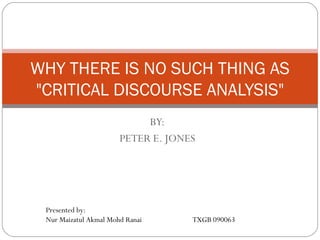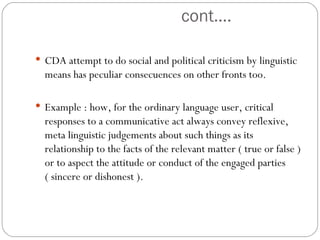No such thing as CDA
- 1. BY: PETER E. JONES WHY THERE IS NO SUCH THING AS "CRITICAL DISCOURSE ANALYSIS" Presented by: Nur Maizatul Akmal Mohd Ranai TXGB 090063
- 2. SUMMARY : The article argues ; There is no such thing as CDA in the sense of political or ideological critique based on the application of conventional linguistics constructs. The constant critical engagement with communication as applied today cannot be captured or accounted for by above application (conventional linguistic methods and concepts). Attempts by CDA to build a method of political and ideological critique out of such entities is misguided and inevitable lead to distorted view of the role of communication in society and social process.
- 3. THE BASIC PROBLEM OF CDA IS DA ITSELF. WHAT? : The categories, elements, and procedures involved in various forms of discourse analysis (DA) based on conventional descriptive linguistics and pragmatics do not/cannot afford any critical purchase on communicative processes. WHY? : Language myth , Harris (1981,1996) i) a refusal or inability to recognise the integration of communicative practices into social processes. ii) ¡®language¡¯ is not a word we may use to refer to the creative communicative endeveours of particular individuals, but the term for an abstract, self-contained system of forms, meanings and rules .
- 4. Author¡¯s point of view REVERSE! Communicative practices can be as objectionable, as oppressive, as demeaning, as abusive and in some cases, as deadly in their consequences and effects. Above is why we constantly find ourselves discussing, arguing, criticizing, countering, ignoring, complaining about or tying to put a stop to communication which we do not want, like or agree with.
- 5. THE CRITIQUE OF COMMUNICATION : COMMUNICATION AS CRITIQUE Introduction - We are continually both reacting critically to messages of all kinds from an unpredictable number of different sources and taking critical flak from others in response to our own. (e.g : to a friend¡¯s bright idea of taking short cut through the back streets, I point out that today is match day (implying that we¡¯ll get sneared up in match traffics if we got that way.) - Our critical rejoinders may receive just as critical a response in return. (e.g : The friend looks in his diary and informs me that I was wrong about the date of the match.) Critical response as engagement Critical response and responsibility Critical response as moral conduct Critical response as indispensable ingredient of all concerted human action. Critical response and reflexivity Critique as intellectual engagement Critical response as skilled communicative practice
- 6. ¡® Language Myth¡¯ as social reality (Fairlough,2001b, p.121) CDA as ¡®a method which can be used in social scientific research¡¯. (Fairclough and Wodak,1997) What puts ¡®C¡¯ to CDA is its explicit political agenda. CDA is ¡®engaged and comitted¡¯. It ¡®intervenes on the side dominated and oppressed groups and against dominating groups¡¯. Openly declares the emancipatory interests that motivate it.
- 7. cont¡ CDA as a form of linguistic analysis can analise neither events nor the concrete integration between communicative and other practices within events. On the assumption that language must be a specific object of investigation in ideological critique, Fairclough feels it necessary to address a problem facing people who are not specialists in linguistics¡¯ which is that ¡® there are many different aspects of the language of an interaction which may be relevant to critical analysis¡¯ (2001b,p.126 ).
- 8. cont¡. CDA attempt to do social and political criticism by linguistic means has peculiar consecuences on other fronts too. Example : how, for the ordinary language user, critical responses to a communicative act always convey reflexive, meta linguistic judgements about such things as its relationship to the facts of the relevant matter ( true or false ) or to aspect the attitude or conduct of the engaged parties ( sincere or dishonest ).
- 9. cont¡ The point is not our judgement about the truth or otherwise the political discourse are unchangeable, unrevisable, still less unfallible, but that our critical responses to and attitede towards this discourse are always influenced and often very large dependent on whether we think the truth or the whole truth is being told.
- 10. Conclusion Ordinary language users ( in other words, all of us ) approach communicative practices and products in a critical spirit. The concious actions of critically apprehending and responding to discourse fall well outside the scope of the orthodox linguist¡¯s conception of what language is and how it works and, consequently, beyond the reach of linguistic methodology.
- 11. cont¡. The linguistic method of CDA are wholly unsuitable tools for the critique of political discourse and certainly do not do justice to the skills that informed political writers and activists employ in the course of their own critical investigation and analysis. The success of CDA in academic circles along with its intelectual respectability and influence within the social science more generally are, the author submits, do to this same myth, which, ¡®like all important myths¡¯
- 12. cont ¡ As Harrys (1981, preface ) puts it , flatters and reflects the type of culture which sponsors it¡¯.
- 13. Please email me at [email_address] for slides sharing. THANK YOU













![Please email me at [email_address] for slides sharing. THANK YOU](https://image.slidesharecdn.com/cdasemester1-101011203417-phpapp02/85/No-such-thing-as-CDA-13-320.jpg)